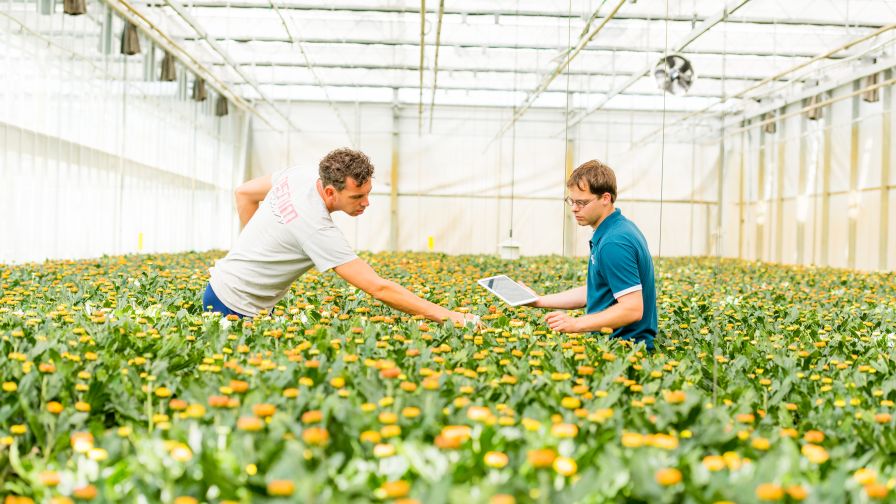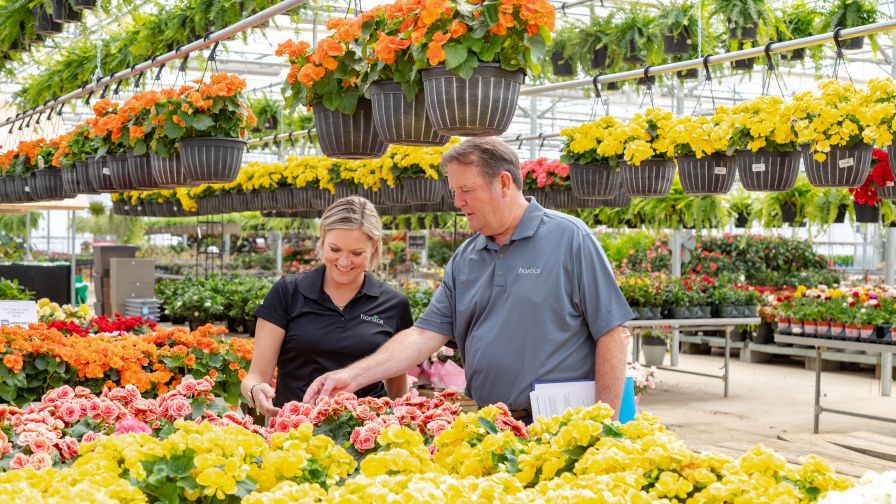Bob’s Market and Greenhouses: Like Father, Like Sons
![Bob's Market And Greenhouses [Slideshow]](https://files.greenhousegrower.com/greenhousegrow/wp-content/uploads/2011/11/29109-150x225.jpg)
Scott Barnitz couldn’t believe the conversation he was hearing between his father, Bob, and a grower customer. Bob was about to make a deal that clearly favored the customer, and Scott, who was just establishing roots in the family business at the time, couldn’t fathom how his dad could settle for accepting less than the price their product was worth.
But as Scott learned that day – and as he and his four brothers learned on many occasions growing up at Bob’s Market and Greenhouses – difficult decisions sometimes need to be made for the betterment of the business.
“I’m not going to make a dime on every deal because that’s putting the dime before the customer,” Scott says. “Once in a while something strange happens, and you can’t jeopardize the relationship for just that one time. By the end of that day, I knew that particular customer would never leave us because they knew they got the best end of the deal. It was a no-brainer for them to stay with us.”
It’s that big-picture perspective – the kind Robert and his wife, Corena, brought to the business and instilled in their five sons – that’s grown Bob’s Market from a roadside market to one of the largest plug growers in the United States. And it’s Bob’s Market’s customer-first approach, among countless other qualities, that put the greenhouse operation based in Mason, W.Va., on the path to becoming Greenhouse Grower’s 2011 Operation of the Year.
“The Barnitzes clearly care so much about what they do,” says Bell Nursery’s Gary Mangum, one of Bob’s Market’s largest plug customers. “From a supplier standpoint I’ve never met anyone quite like them in how they care and how well they communicate. The integrity factor is just amazing. I can’t even think of anything over the years that has created a problem for us.”
All-Out Customer Service
George Lucas, owner of Lucas Greenhouses, can’t put his finger on a problem Bob’s Market has caused him over the years either. Like Mangum, Lucas is in awe of how Bob’s Market consistently churns out quality product. He’s wowed by Bob’s Market’s ability to continuously deliver product when he needs it, and he admires the Barnitz family for its ability to make the business such a family affair.
Bob’s Market doesn’t just step up for Top 100 Grower customers like Lucas Greenhouses, though. According to Lucas, Bob’s Market provides that same value-driven service for growers big and small.
“They take care of everybody,” Lucas says. We all jump for opportunities with the big growers, but the Barnitzes jump for everybody. It’s a business philosophy: Big or small, every person is part of a whole.”
Kathy Miller, owner of Trail Nurseries in Dover, Pa., is a big proponent of Bob’s Market as well. She was first acquainted with Bob’s Market in the late-1990s as the head grower at Bell Nursery, where she developed a good rapport with Rick Barnitz, the head grower at Bob’s Market.
”Rick actually came out and helped me with my fall pansy crop,” Miller says. “He just went above and beyond. They recognized that maybe I needed a little help, and Rick was great.”
Miller has since moved on from Bell Nursery to Trail Nurseries, a wholesale operation she owns with her husband and brother-in-law. Still, Bob’s Market’s willingness to lend a hand to Miller hasn’t wavered. Instead, the operation’s relationship with her has grown even further.
“This industry is a lot about relationships,” Miller says. “We are fortunate to have one with Bob’s Market. It’s the whole package that makes them more valuable as a supplier for us. Freight, for example, is getting so expensive. It’s nice to know they’re going to be bringing everything to us on one truck.”
Bob’s Market, like many growers, has a group of drivers it leans on to get product to the customer. But all five Barnitz sons adopted their father’s appreciation of transportation. Robert taught all five sons to drive 18-wheelers at an early age, and some sons still hop in the truck on occasion to deliver product and catch up with customers. That level of personal touch, the family has found, builds not only a trust but a friendship, in some cases, between growers.
“Bobby (Barnitz) takes it as far as trying to keep the same drivers on the same routes from week to week,” says Jeff Barnitz, fleet manager. “When you get into heavy plug shipping you have a lot of the same customers. The drivers and customers actually build a relationship. Sometimes when we’re super busy I even drive. As does Rick.”
Bob’s Market’s delivery also stands apart because it’s willing to ship day or night – no questions asked.
“We have our large ship weeks, and they’ll bring a trailer on a Sunday night, on a Tuesday night – however we need it they’ll accommodate,” Mangum says. “That’s been there since early in the relationship. You’re going to be taken care of with them.”
Elevating Standards
Grower customers aren’t the only ones to pick up on the Bob’s Market attitude toward quality, customer service and business integrity. Ball Seed’s Anna Ball, Marvin Miller, Mark Snyder and John Veigel identified those qualities in Bob’s Market in the late 1990s when they invited the Barnitz family to become a plug producer for Ball. More recently, Dümmen USA gave the business the opportunity to become a rooting station for its product.
Clearly, the Barnitz family has done something right to warrant those opportunities. On the plug side, Robert has often thought about how he developed the know-how and attention to detail it takes to produce quality plants. Oddly enough, he believes he developed those skills in his previous career as a lab technician at a Goodyear polyester plant.
”It was routine work but we sampled all of the raw materials coming in that were used in the process of making polyester,” Robert says. “We were testing batches produced for quality standards, and everything had to be at spec. There were so many tests we had to do, and you have to be very accurate or the test you run is going to be error prone.”
The same attention to detail applies on a seeding line, but few growers aim for the high germination rate Bob’s Market does.
”Let’s say you’re going to sow 14 petunia varieties and you took an average germination – 95 percent germ – but only get 90 percent,” Robert says. “If you go through the whole year at that rate, what is 5 percent of $2.5 million? It’s a big chunk of money.”
Trays must be repatched in that scenario, meaning growers are reaching deeper into their pockets to pay extra labor costs. Even if growers sow buffer trays, there are extra labor costs associated with those. So why, Robert asks, do growers put themselves in a position to redo such tasks when they can do them right the first time?
If we don’t pay attention to details – how much water was put on a tray, for example – we’re putting ourselves in a bad position,” Robert says. “What I’ve found with finished product is it costs very little, other than maybe time, to produce a good quality plant. Too many growers think what they’re producing is good quality. You can never change them because in their mind they think that’s a pretty hanging basket or a pretty flat of plants, when really you look at it and can see it wasn’t growth regulated correctly.”
Conservative use of plant growth regulators is one reason the Barnitzes have been able to grow their plug business exponentially these last 15 years.
”When you do a trial, don’t go hog wild,” Rick says. “You can’t take these chemicals back. You’ve screwed up your crop, and you’ve screwed up a lot for your different customers.”
Paying attention to the details is key to Bob’s success. Talk to Robert, Bobby – or any Barnitz for that matter – and they’ll all tell you paying attention to the details is at the foundation of everything Bob’s Market does.
“Every now and then I’ve got to have a meeting with the production crews to say we have to get back on track,” Bobby says. “Take the example of someone having 500 trays of an item to sow. You want to get the job done quicker, but sowing a tray is like driving a car: You can drive 3 mph faster but in the big picture, you’re only going to be three miles farther down the road.”
Putting People First
To Scott, one of Bob’s Market’s biggest strengths is its diversity, which is seen in both the business’s makeup (young plants, wholesale finished and five retail outlets), as well as in the five Barnitz sons. While Scott manages retail, Jeff manages the operation’s fleet, John is in charge of finished production, Rick is head grower and Bobby manages the plug deparment and works most closely with customers.
“There are so many pieces to their business but they have a specialist in every area you need,” Mangum says.
In addition to the immediate family, Bob’s Market has a number of long-standing employees who’ve treated the business as if it’s their own.
”One of the biggest strengths we can bring to our customers is our long-standing retail associates,” Scott says. “We shut down the retail January and February, and we bring all those workers to the greenhouse. They’re developing a stronger knowledge and experience. In March, it becomes a bit of a challenge to us because we need to let them go back to retail, but their experience at the greenhouse goes a long way.”
Bob’s Market takes yet another unique approach to its seasonal labor force. The business pays unemployment to every employee – even the seasonal ones. The benefit Bob’s Market sees is that every employee it calls back to work is obligated to return. Those employees are, in turn, the most experienced seasonal employees available to Bob’s, which Robert indicates pays 65 percent of every employee’s full medical insurance policy. Bob’s also offers a 401k program to help employees plan for their futures.
”There are a lot of employees who’ve been with me for 12, 14 years,” Robert says. “I would like to thank all past and present employees who’ve been with us and dedicated to the success of Bob’s Market. We couldn’t do it without them.”









